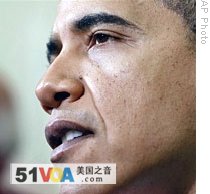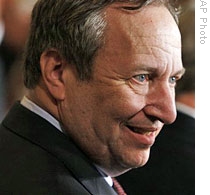Washington
13 March 2009
 |
| Pres. Obama makes remarks in the Oval Office of the White House, 13 Mar 2009 |
President Obama's top economic adviser, Lawrence Summers, says the financial crisis has led to an "excess of fear" that must be ended to allow the economy to rebound. Summers, the president's director of the National Economic Council, says the crisis was caused by an "excess of greed." "We have seen too much greed and too little fear, too much spending and not enough saving, too much borrowing and not enough worrying. Today, our problem is very different," Summers said.
Summers told a Washington research organization, the Brookings Institution, the "vicious cycles" of fear have led the financial markets to resemble an avalanche. But he reminded the audience that all financial crises end.
Mr. Obama says the economy must still get through a "difficult period," but he says the U.S. is well equipped to make an economic comeback, with the help of his recovery programs. "If we are keeping focused on all the fundamentally sound aspects of our economy, all the outstanding companies, workers, all the innovation and dynamism in this economy, then we are going to get through this. And I am very confident about that," he said.
After he met with economic adviser Paul Volcker, a former chairman of the Federal Reserve, Mr. Obama said his administration is laying the foundation for what he called a "post-bubble economic growth" that will not repeat the risks that led to the current crisis. "The days when we are going to be able to grow this economy just on an overheated housing market or people maxing out on their credit cards, those days are over," Mr. Obama said.
 |
| National Economic Council Director Lawrence Summers at the White House on 23 Feb 2009 |
Meanwhile, Treasury Secretary Timothy Geithner met in Britain on Friday with finance ministers from 19 other wealthy and developing countries. Mr. Obama is calling on the G-20 nations to approve large stimulus programs to boost their slumping economies. "We have got to do some coordination with other countries in order to assure that what we do here in the United States corresponds with strong efforts overseas," he said.
And the U.S. trade deficit dropped in January to its lowest level in six years. Americans' demand for imported goods fell faster than demand for U.S. exports. It was a record sixth consecutive monthly decline for the trade deficit.